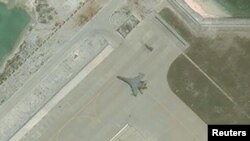The Philippine foreign secretary said Monday that China has been notified of "red lines," or actions Manila would find unacceptable, in the South China Sea, including construction activities at a disputed shoal and extraction of oil and gas in the long-contested waters.
Foreign Secretary Alan Peter Cayetano explained what President Rodrigo Duterte's administration has been doing to defend the country's sovereignty in the disputed region amid criticism that it has been far too soft on China.
Critics and left-wing groups have slammed Duterte for not publicly raising alarm over recent Chinese actions, including the reported installation of missile defense systems on its newly constructed islands, and for not demanding immediate Chinese compliance with a 2016 arbitration ruling that invalidated Beijing's expansive claims in the South China Sea and upheld the Philippines' sovereign rights to exploit resources in vast stretches of waters off its western coast.
"For those who keep saying, `File a protest, file a protest,' what do we mean when we said, `We are taking all diplomatic actions'?" Cayetano said in a flag-raising ceremony at the Department of Foreign Affairs.
"At the right time, we will prove you wrong because nothing is secret forever," Cayetano said. "When we declassify all of these, once we have achieved our purposes in the future, you will see that the DFA has not fallen short in filing whatever diplomatic action, note verbale, verbal protest."
After Duterte appointed him as the country's top diplomat last year, Cayetano said the Philippines and China had discussed the thorny territorial issues, including actions that each deemed unacceptable. For the Philippines, these included any Chinese construction at disputed Scarborough Shoal or Chinese effort to remove a rusty Philippine navy ship used by Filipino marines as a detachment in another contested outcrop, Second Thomas Shoal.
"Filipino troops should not be harassed while on resupply missions or when repairing [facilities] like a runway," he said. "Another red line for us: Nobody can extract natural resources there on their own."
"The president has declared that. If anyone gets the natural resources in the West Philippine Sea-South China Sea, he will go to war," Cayetano said.
China has told the Philippines that there should be no new occupation of uninhabited areas under a 2002 accord and "we should not embarrass each other in front of all, in all multilaterals and bilaterals," he said.
After taking power nearly two years ago, Duterte declared he would chart a foreign policy not highly oriented toward the United States, the country's treaty ally. He took steps to revive frosty ties with Beijing while seeking to boost Chinese trade, investment and infrastructure funds.
Cayetano has staunchly defended the tough-talking president, including his deadly crackdown on illegal drugs.
"It is not the policy of this administration to engage in megaphone or microphone diplomacy, and announce each and every action, unless announcing it is beneficial to us," Cayetano said.
Filipino fishermen have been accosted by China in the past but have been allowed back to Scarborough Shoal's area to fish. The shoal's vast lagoon has been declared off limits to all fishermen to nurture fishery stocks, and a coast guard agreement now allows vessels to enter the lagoon for safety in stormy weather, Cayetano said.
Critics say Duterte's approach has emboldened China, which has been increasingly assertive in the potentially oil- and gas-rich waterway that's also claimed entirely or in part by Vietnam, Malaysia, Taiwan and Brunei.




